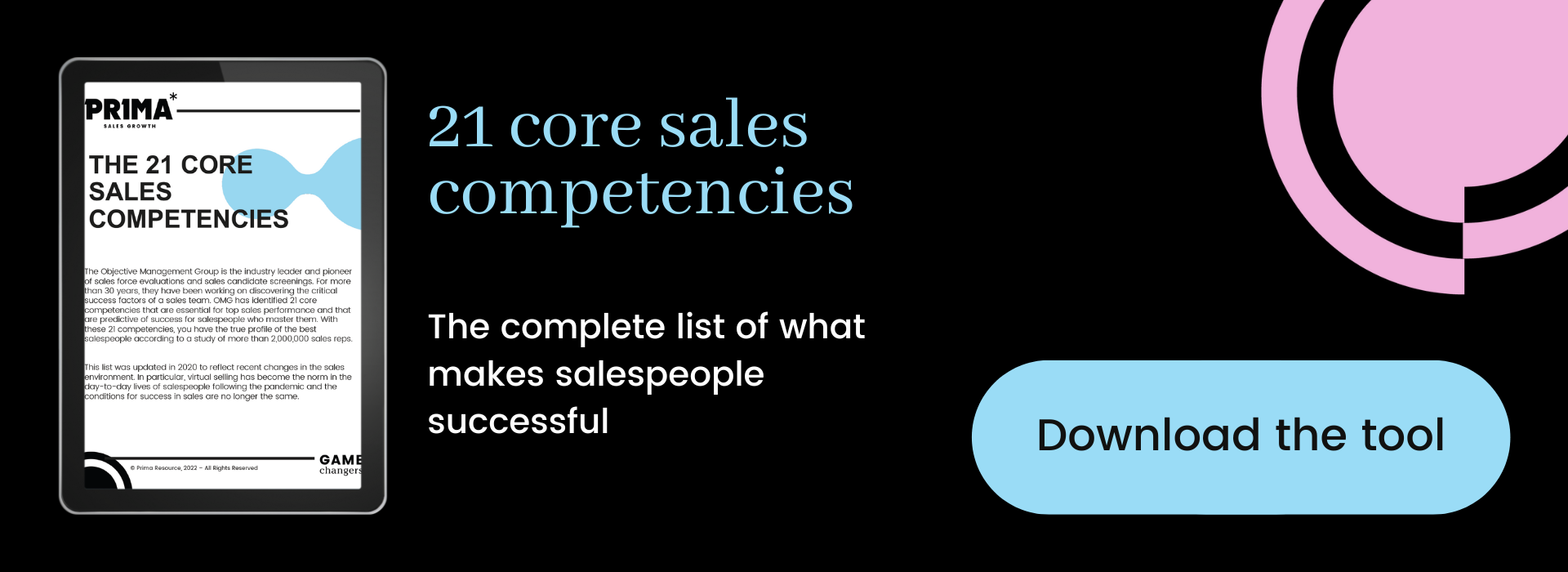
Detrimental to sales performance, limiting beliefs are strongly rooted in 84% of salespeople. Non-justified, these false beliefs are accumulated over time through experiences, and are often used as excuses for lack of results. Although it affects a large number of reps, this weakness can also be found in the higher levels of the sales organization.
These negative ideas can, and must, be replaced with new beliefs that support performance in sales and allow the representative to perform the sales process efficiently.
#1: I don’t have time for prospecting.
This is the most common belief in the sales force, because prospecting is an extremely demanding activity. It requires a lot of perseverance and the ability to withstand a succession of “no’s.”
Prospecting is, however, a must for all salespeople assuming the “hunter” role, that is, those who are searching for new clients and therefore need to maintain a constant level of new opportunities in their pipeline.
New belief that supports performance in sales: prospecting is essential to achieve my personal goals.
#2: It’s normal for prospects to bring up objections.
For most representatives, managing objections is a recurring and anticipated phase of the sales process. They expect for objections to come up in their conversation with the prospect. In a way, representatives are going into these discussions ready to face and deal with objections.
However, an objection is more or less an opportunity to ask the relevant questions that will allow for deeper conversation and thus allow the representative to determine the client’s real problems.
They are many ways to handle sales objections. It’s possible to get ahead of the prospects and remove the opportunity to object: “From the get go, I can tell you that we are not the cheapest and usually, clients choose to work with us for X and Y reasons”. . .
New belief that supports performance in sales: I do not believe in objections and so I won’t face any. [Dave Kurlan]
#3: If potential clients are satisfied with their current supplier, I can’t convert them.
The concept of satisfaction is quite relative, and it won’t have the same meaning in terms of people and context. This belief is very present because questioning a client’s satisfaction requires specific skills.
Finding out what makes the prospect happy with his current supplier should not be a way to bring up the benefits and perks of your solutions. This really needs to be done for an informative purpose and to understand if all the prospect’s needs and problems are being met at the present time.
New belief that supports performance in sales: I need to understand what determines my prospect’s satisfaction.
# 4: I can’t sell without documentation.
Documentation doesn’t make the sale. What makes a sale is the representatives’ ability to ask relevant questions to identify and quantify the cost of the prospect’s problems, to understand the impact at the corporate and personal levels and prompt the sale. Documentation doesn’t do this, it only presents your services or products.
Presentation is somehow an enemy rather than an ally of the representatives. The visuals make the salespeople embark far too early in presentation mode, even before having identified a problem, the cost and consequences associated with it, the compatibility between the lead and your company, the decision process, and so on.
In total, 84% of salespeople present at the wrong moment.
New belief that supports performance in sale: I must present only when I get a lead from the prospect.
#5: I must submit quotes to help prospects decide.
When representatives present quotes to prospect that are not yet ready to make an actual decision, in most cases, the prospect will simply use it to shop with the competition. By giving a quote too early, you allow the prospect to base his decision on pricing (and ask you for discounts) which is a non-emotional factor. The tendency of bidding over keenly is a manifestation of the difficulty to talk about money that affects more than half of salespeople.
New belief that supports performance in sale: The prospect does not need a quote to decide. I must help him make his decision before providing a quote.
Takeaway
Good salespeople don’t have limiting beliefs so by identifying your representatives’ restrictive beliefs, and replacing them with beliefs compatible with sales performance, you limit the chances of them erring when they perform the sales process. Individual coaching through role-playing with your reps is an effective way to overcome these beliefs.
A sales force evaluation can precisely identify these restrictive beliefs (66 in total) as well as the major weaknesses underlying them. Having strong supportive beliefs is one of the 6 elements of the sales DNA that play an essential role in sales performance.






